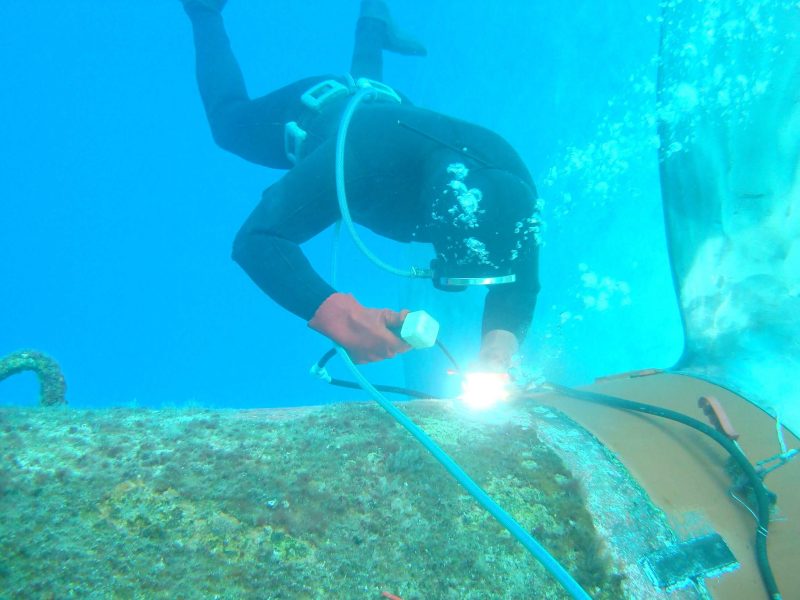Some weld. Some dive. Ever thought of combining these professions?
You’re not alone.
Underwater welding takes very little time to learn, but years to master. Many underwater welders start their journey in diving school, intent on taking the plunge as quickly as possible.
Underwater welders can earn some serious money:
With the proper experience, you can easily take home over $100,000 in a year according to divers and diving school representatives I’ve spoken with and researched.
Most earn around $25,000 – $80,000 annually. However, very little of your time will actually be spent welding underwater. Technically, underwater welders are classified as commercial divers.
Your career will be focused in one of two locations: Offshore or Inland.
Here’s a breakdown for you:
[elementor-template id=”13402″]
Inland Income
Among the ponds, rivers and lakes of your area, you’ll bring home a paycheck of about $40,000 – $80,000. Most of your work will focus on dock areas, bridges, dams and small vessels.
Inland welder divers don’t get the money of their offshore counterparts.
But they have the luxury of a less rigorous schedule (40 hour weeks) and less traveling. Unfortunately, when it comes to welding, freshwater makes for a more unstable environment due to the lack of salt ions.
Plan on plenty of practice before striking your arc here.
Offshore Income
In the ocean, you’ll earn $40,000 – $100,000 or more each year.
Offshore underwater welders spend most of their time on oil rigs or large marine vessels like Navy ships. Their work schedule rarely lets up: It’s not uncommon to work 80 or more hours in a single week. However, due to your intense schedule, underwater welders will usually come back inland after a month out at sea.
Out in the ocean, underwater welders do a good deal of cleaning, pipe welding and installation underneath major platforms. They must possess a good head for the large machinery repair.
And if they have experience as a Diver Medical Technician – that’s a big bonus.
Unlike inland diving, offshore welder divers must come in for the winter. Oceans are simply too perilous: Tidal waves, hurricanes and the like.
If you’re thinking ahead of time, you can find seasonal employment with a welding shop along the coasts and gain additional welding experience until spring comes.
The Money Tide
Either inland or offshore, underwater welders’ earning potential takes major leaps after the first 3 – 5 years in the industry.
These formative years shape…or break you. If you make it through, you’ll be the big fish: You’ll have a much higher chance of employment than the minnows – your less experienced colleagues.
Underwater Welding: Career Earning Percentiles
Wanting specifics?
Here’s a breakdown of some of the latest underwater welder earnings in the US:
- $29,220 (Lower 10%)
- $45,890 (Median 50%)
- $84,370 (upper 90%)
The Bureau of Labor Statistics comes out with a report each year and provides these stats.
Besides experience, underwater welders should be conscious of the other characteristics that increase your earnings.
Under Pressure…& Depth
Underwater welders rarely do any actual “welding” below 15 meters, but there’s plenty of other maritime work in demand below this level. Saturation diving (major water depth for days or weeks) is an extremely competitive branch of this field, primarily because of the pay.
Employers may pay anywhere from, $1 – $4 per foot.
That may not sound like much, but the feet certainly add up; it’s not uncommon for a diver to work in a depth of 500 feet or more.
Heavy Clocking: Overtime
The nature of diving work has a natural ebb and flow, just like the tide. Underwater welders on offshore projects may expect a two or three 60-hour work weeks in a row (or one 80-hour week). And all of that overtime isn’t cheap: Usually, a 50% increase in hourly wages is considered standard.
Underwater welders take advantage of these heavy work seasons, as work will generally drop off in colder months (at least offshore).
Certification Levels: Higher certification qualification means you can meet greater challenges. Employers will pay more for your skillset.
Job Execution: Like all careers, you have a specific set of responsibilities that must be met to a “satisfactory” or better grade.
Placement: If you’re offshore, pay can increase the further away from shore you travel. This is due to the greater risk you’re exposing yourself to.



Hey Garrett,
Thanks a lot for this brief, but informative article. Strange that there was nobody else to comment as I found the info very useful. I am consindering a career in underwater welding, so appreciate the output.
Take care!
Dom.
Thanks for the article, I’m soon to be joining the Commercial Diving world, and it’s good stuff to know!
This is extremely helpful! I knew nothing on this profession and this brief overview is just what I needed to be somewhat knowledgeable on the subject.
Thank you for this article.